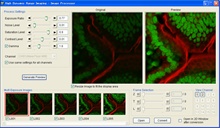Channels
Special Offers & Promotions
New updates to the Olympus FV10-ASW software extend FluoView FV1000 and FV1000MPE laser scanning capabilities
 Olympus has introduced FV10-ASW
3.0, the latest version of its software for the
FluoView FV1000 range of confocal laser scanning microscopes (cLSM) and
Fluoview FV1000MPE (multiphoton excitation) systems. By incorporating high
dynamic range imaging (HDRI), a greater dynamic range of fluorescence between
the lightest and darkest areas of a sample is obtained. Furthermore, signal to
noise ratios are minimised, enabling clear, highly resolved images to be
easily captured. Additional functionality, such as partial stitching with
multi area time lapse imaging, and channel un-mixing for the FluoView FV1000MPE
systems, provides advanced flexibility for obtaining the best possible LSM images,
every time. The new software is also fully compatible with Microsoft Windows
7.
Olympus has introduced FV10-ASW
3.0, the latest version of its software for the
FluoView FV1000 range of confocal laser scanning microscopes (cLSM) and
Fluoview FV1000MPE (multiphoton excitation) systems. By incorporating high
dynamic range imaging (HDRI), a greater dynamic range of fluorescence between
the lightest and darkest areas of a sample is obtained. Furthermore, signal to
noise ratios are minimised, enabling clear, highly resolved images to be
easily captured. Additional functionality, such as partial stitching with
multi area time lapse imaging, and channel un-mixing for the FluoView FV1000MPE
systems, provides advanced flexibility for obtaining the best possible LSM images,
every time. The new software is also fully compatible with Microsoft Windows
7.
As an advanced image composition technique, HDRI provides users with a powerful tool to achieve high-quality images with outstanding contrast and no saturation. By effectively merging multiple images captured under different exposure settings, the final image provides outstanding clarity, with the ability to visualise even the more challenging cellular components.
With advanced multi area time lapse functionality, version 3.0 of the FV10-ASW software allows users to select specific areas of the whole sample, which can be chosen and stitched together with ease. This time-saving function is key in allowing the quick and simple analysis of specific regions of interest.
With specific advances for the FV1000MPE systems, the non-descanned detectors, which enable users to cover every multiphoton excitation requirement and acquire maximum fluorescence output, can now also be used for channel un-mixing. As a result, users can perform spectral un-mixing of multi-colour samples, even those with significant spectral emission cross-over. A laser limiter also sets upper intensity boundaries to avoid over stimulation of sensitive samples, thus ensuring that cellular integrity is maintained.
The FluoView range
The Olympus FluoView FV1000 microscope systems incorporate a unique SIM scanner concept with two independent, fully synchronised laser scanners in a single, compact design. This enables simultaneous, high resolution confocal observation. The advanced optical detection system of the FV1000 provides superior linear spectral distribution throughout the wavelength range of 400 to 800 nm.
Based on the FluoView FV1000 cLSM, the FV1000MPE system for deep in vivo imaging of live and thick slice samples is available in three different models. Each incorporates Olympus's market leading components such as the UIS2 optics. The systems are fully configured to ensure the best excitation efficiency, allowing accurate imaging hundreds of microns deep into a specimen. Researchers can therefore achieve in vivo optical sectioning, without causing any significant photobleaching or phototoxicity.
For further information please visit www.microscopy.olympus.eu
Media Partners


